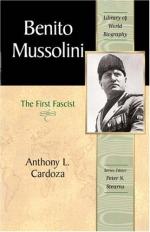|
This section contains 7,331 words (approx. 25 pages at 300 words per page) |

|
SOURCE: “The American Writer, Fascism and the Liberation of Italy,” in American Quarterly, Vol. XVIII, No. 4, Winter, 1966, pp. 599-614.
In the following essay, Diggins explains the varied reactions of American literary intellectuals—including Henry Miller, John Horne Burns, Sinclair Lewis, and Ernest Hemingway—to Italian fascism and Mussolini, noting that few American writers managed to rise above “narcissistic nationalism” when dealing with the issue in their works.
The sudden fall of Benito Mussolini in July 1943 brought poetic as well as political justice. The first nation to succumb to Fascism, Italy was the first to be liberated by the democracies. To many Americans, the Allied advance up through the Italian boot seemed a cleansing “wind of the south” which, matched by the partisans' “vento del nord,” would soon purge Italy of her Fascist past, redeem her liberal heritage and ultimately destroy the Thousand Year Reich beyond the Alps. The...
|
This section contains 7,331 words (approx. 25 pages at 300 words per page) |

|


